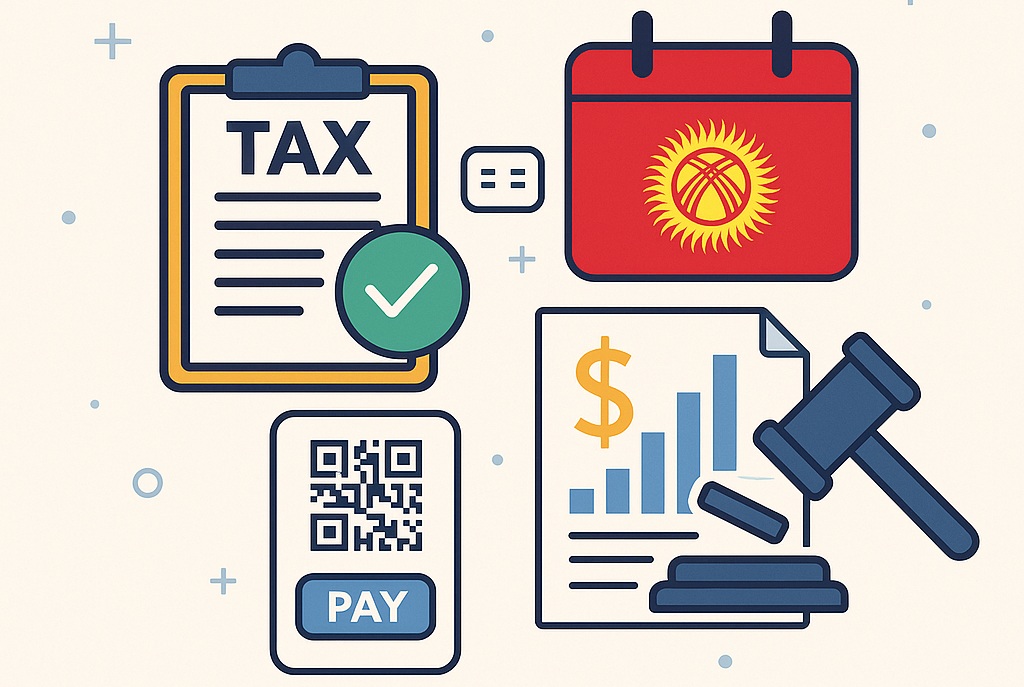In 2025, significant changes to the tax system will come into effect in Kyrgyzstan — essentially a small-scale tax reform aimed at easing the tax burden, simplifying administration, and promoting active digitalization. Here are the key updates:
1. Simplified payments via QR code
Starting July 1, 2025, all taxes and social contributions will only be accepted using a QR code or a unique payment code. This will speed up budget inflows, improve transparency, and make services faster for citizens.
2. Elimination of the transport tax and amnesty for old obligations
Both individuals and companies are exempt from vehicle taxes: this tax has been abolished as of January 1, 2025, and outstanding debts have been written off.
Additionally, tax arrears accrued before January 1, 2022 (if no court rulings were issued), are annulled.
3. Extension of land tax benefits
Agricultural land will retain a zero rate until the end of 2030.
4. New rates for unified and trade tax
For small businesses, the annual income threshold for preferential unified tax rises from 30 million to 50 million KGS.
Rates: 0% — up to 15 million; 0.5% — up to 50 million.
Traders with anonymous customers will pay a unified tax fixed at 4%, regardless of turnover.
5. New incentives for jewelers
The tax rate for jewelry producers and sellers will be only 0.25% of turnover.
6. Amnesty for agricultural exporters
Companies exporting livestock will have 80% of their main tax debt and 100% of penalties written off.
7. Simplified accounting for SMEs
For small and medium businesses, penalties for missing primary documents related to income tax are canceled, with the option of voluntarily filing a unified declaration.
8. Transition of construction companies to unified tax
Construction firms can voluntarily switch to a simplified regime: 6% (cash payments) or 4% (non-cash) until July 1, 2025.
9. Revised property tax
Property tax on residential houses will now be calculated as: tax rate (in KGS per m²) × total area (minus exemptions). Rates are set by local councils and will not exceed 100 KGS/m². Deadline for payment — September 1, 2025.
10. Electronic invoices and VAT treatment
VAT credits will only be allowed for non-cash payments.
Electronic invoices are mandatory for profit deductions and purchases from patent holders or special regimes.
11. Active inspections and asset declaration
From January 2025, inspections based on electronic consignment notes (ETTN) will resume — violations will result in fines. The voluntary declaration of assets will also end, and enhanced monitoring will begin.
12. New tax audit
As a part of tax reform to support SMEs, a voluntary form of “tax audit” is introduced instead of regular inspections (no penalties, only advisory role). Audits of past tax periods will be prohibited.
Outcomes and forecasts
This large-scale tax reform aims to support small businesses and stimulate economic activity:
- Reduces bureaucracy and the number of minor inspections;
- Increases transparency and digitalization of payments;
- Provides preferential rates that exempt entire sectors (self-employed, jewelers, builders, farmers);
- Ensures financial relief through debt write-offs and a ban on retroactive audits.
By 2025, Kyrgyzstan declares its ambition to create a simple, tech-friendly, and entrepreneur-oriented tax environment. It is set to become the most business-friendly system in the region — especially with QR payments, transport tax elimination, expanded thresholds for simplified regimes, and personalized audits.
What you should do before 2025:
- Transition from paper ETTNs to digital consignment notes.
- Confirm absence of tax debts prior to 01.01.2022.
- Adjust your business to the new rates (construction, jewelry, unified tax).
- Connect online QR payments now.
